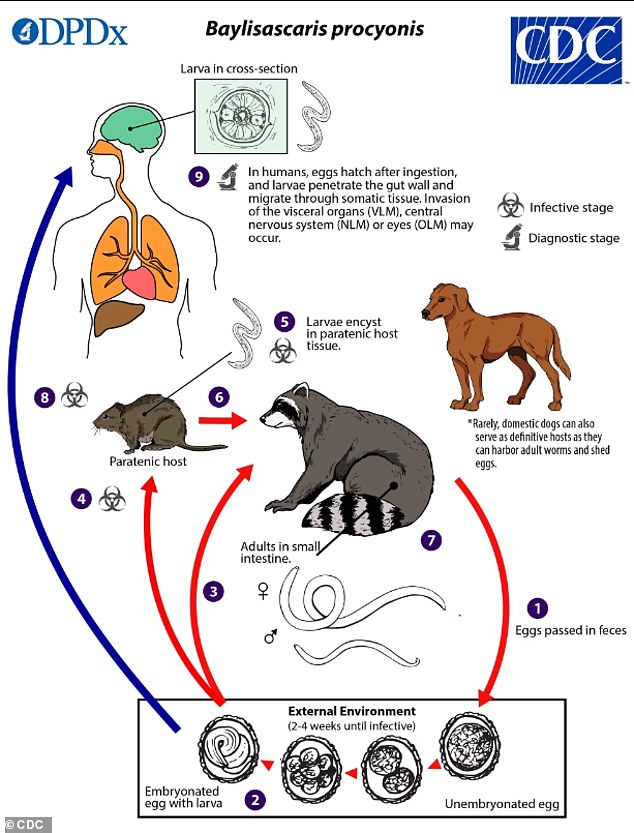Two people in LA get brain-eating parasite from raccoons in ‘worrying’ incident
Two people in Los Angeles have been infected with a parasite transmitted by raccoons that can lodge in the brain and cause blindness.
The individuals, who could not be identified, live in the South Bay region and have been diagnosed with Baylisascaris procyonis, or raccoon roundworm.
Raccoon roundworm is a common parasitic infection in raccoons. The worm infects their intestines and the eggs are excreted in their feces.
However, the infection is rare in humans. According to authorities in the region, the risk to the population is currently ‘low’.
However, they are warning the public about the parasite transmitted by raccoons after a spike in rabies cases among raccoons was reported earlier this year and because the animals are increasingly being seen in neighborhoods where people are at greater risk of exposure to the parasites.
Raccoons are increasingly appearing in neighborhoods, increasing the risk of people coming into contact with them and becoming infected (stock)
No further details were released about the patients, including their age, gender and the symptoms they suffered from.
Symptoms of infection with the parasite include mild fever, fatigue, or nausea, but can quickly progress to neurological symptoms.
In severe cases, organ damage can be so severe that patients die from the disease.
A county spokesperson said: “The confirmed cases of this rare infection are an important warning to everyone in Los Angeles County to take precautions to prevent the spread of diseases from animals to people.
“Although (raccoon roundworm) is rare in humans… it is of concern because many raccoons live near people, and the infection rate among raccoons is likely high.”
To date, only 23 cases of raccoon roundworm in humans have been recorded in the medical literature, of which six patients (26 percent) have died from the disease. However, doctors say the number of cases is likely far too low, as the infection is often misdiagnosed.
Other patients suffered from conditions throughout their lives, such as blindness and brain damage.
Previous cases in the US include a teenager from Brooklyn, New York, who went blind in one eye in 2009, and a baby who suffered brain damage after contracting the disease.
In 2021, a one-year-old boy in Canada became infected after eating raccoon feces from a flower pot in his yard. He was treated promptly and suffered no long-term effects.

The above graph, from the CDC, shows the life cycle of the raccoon roundworm
It is estimated that 40 to 60 percent of raccoons are infected with the raccoon roundworm.
The animals are not affected, but they can excrete the disease in their feces. People can then pick up the eggs if they come into contact with the feces.
In rare cases, dogs can serve as hosts for Baylisascaris procyonis.
When a person accidentally swallows the eggs, the parasites enter the intestines and enter the bloodstream.
From there they travel to organs such as the liver, lungs, eyes and brain and dig tunnels, causing inflammation and damage to surrounding organs.
Symptoms may appear one week to one month after infection.
Raccoon roundworm is diagnosed by testing to rule out other diseases. There is no specific test available for raccoon roundworm.
Treatment should be prompt and involves taking the antiparasitic drug Albendazole. If administered promptly, patients may not experience any adverse effects.
